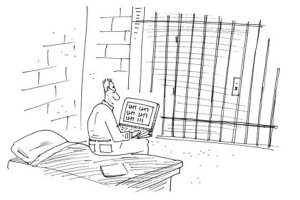Password sharing considered a felony under proposed hacking laws
Posted by: Jon Ben-Mayor on 01/22/2015 03:56 PM
[
 Comments
]
Comments
]
Imagine that by simply giving your child the Netflix password could land you in federal prison for 10 years - let that sink in for a minute - at this point in my life I would have been convicted of this very thing at least 20 times and that is only this week; the young woman child of the house can't seem to remember a password to save her life and is constantly screeching for it.
 "Even if you don't do any of this, you can still be guilty if you hang around with people who do," said Robert Graham, CEO of Errata Security in Atlanta, in a blog posting last Wednesday (Jan. 14). "Hanging out in an IRC chat room giving advice to people now makes you a member of a 'criminal enterprise,' allowing the FBI to sweep in and confiscate all your assets without charging you with a crime."
"Even if you don't do any of this, you can still be guilty if you hang around with people who do," said Robert Graham, CEO of Errata Security in Atlanta, in a blog posting last Wednesday (Jan. 14). "Hanging out in an IRC chat room giving advice to people now makes you a member of a 'criminal enterprise,' allowing the FBI to sweep in and confiscate all your assets without charging you with a crime."
The proposed changes to the CFAA and related laws, posted online by the White House early last week, would broaden the definition of computer crime and stiffen penalties for existing crimes, including doubling the maximum penalty for many violations from 10 years to 20 years.
The CFAA is built on the concept that "unauthorized access" or "exceeding authorized access" to certain classes of "protected computers" is a crime under certain circumstances. The White House proposal removes the existing qualifications that the accessed computer has to contain financial, personal or government information. That is a scary change as it could be pointed at anyone of us at any time.
Along with its Hacking Prohibition law, Robert Graham says Obama is also proposing a massive Internet Surveillance law. Companies currently monitor their networks, using cybersecurity products like firewalls, IPSs, and anti-virus. Obama wants to strong-arm companies into sharing that information with the government, creating a virtualized or “cloud” surveillance system.
In short, President Obama’s War on Hackers is a bad thing, creating a Cyber Police State. The current laws already overcriminalize innocent actions and allow surveillance of innocent people. We need to roll those laws back, not extend them.
Sources: Tom's Guide and Errata Security
 "Even if you don't do any of this, you can still be guilty if you hang around with people who do," said Robert Graham, CEO of Errata Security in Atlanta, in a blog posting last Wednesday (Jan. 14). "Hanging out in an IRC chat room giving advice to people now makes you a member of a 'criminal enterprise,' allowing the FBI to sweep in and confiscate all your assets without charging you with a crime."
"Even if you don't do any of this, you can still be guilty if you hang around with people who do," said Robert Graham, CEO of Errata Security in Atlanta, in a blog posting last Wednesday (Jan. 14). "Hanging out in an IRC chat room giving advice to people now makes you a member of a 'criminal enterprise,' allowing the FBI to sweep in and confiscate all your assets without charging you with a crime."The proposed changes to the CFAA and related laws, posted online by the White House early last week, would broaden the definition of computer crime and stiffen penalties for existing crimes, including doubling the maximum penalty for many violations from 10 years to 20 years.
The CFAA is built on the concept that "unauthorized access" or "exceeding authorized access" to certain classes of "protected computers" is a crime under certain circumstances. The White House proposal removes the existing qualifications that the accessed computer has to contain financial, personal or government information. That is a scary change as it could be pointed at anyone of us at any time.
Along with its Hacking Prohibition law, Robert Graham says Obama is also proposing a massive Internet Surveillance law. Companies currently monitor their networks, using cybersecurity products like firewalls, IPSs, and anti-virus. Obama wants to strong-arm companies into sharing that information with the government, creating a virtualized or “cloud” surveillance system.
In short, President Obama’s War on Hackers is a bad thing, creating a Cyber Police State. The current laws already overcriminalize innocent actions and allow surveillance of innocent people. We need to roll those laws back, not extend them.
Sources: Tom's Guide and Errata Security
Comments






